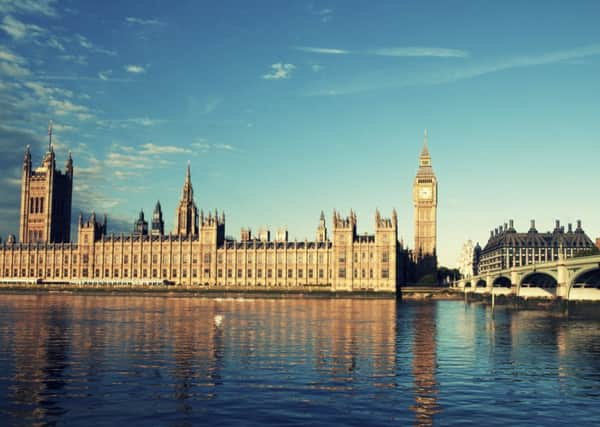General election system ‘biased towards Labour’


Polling expert Professor John Curtice of Strathclyde University also found that Labour is likely to need a five-point lead to win a majority – whereas the Conservatives will require a seven-point one.
FOLLOW US
SCOTSMAN TABLET AND MOBILE APPS
Part of his research in the report, titled The Lottery Election, focused on what might happen in Scotland, where the SNP are currently poised to win around 50 of the 59 seats with 45 per cent of vote, compared to Labour’s 27 per cent.
Advertisement
Hide AdAdvertisement
Hide AdThe high allocation of seats to the SNP would happen on current poll ratings, with Labour struggling to hold on to six seats.
But if Jim Murphy’s party manages to close the gap to ten points, his party would keep around half their current 41 Scottish seats and if they can draw level in support, only three or four seats would be at risk from the Nationalists.
Prof Curtice said: “Labour would not need to get anywhere near its level of support [of 42 per cent] in Scotland in the 2010 general election to hold on to all or most of its seats.
“What we see is relatively small fluctuations can make a huge difference in the amount of seats the SNP win, largely because of Labour’s large majorities in many of these seats.”
However, he also warned that the SNP could also “over-achieve” and become the third party in the UK, which he said would undermine the first-past-the-post system.
He said: “Although the system looks set to be tough on some smaller parties, such as Ukip and the Greens, it could prove quite generous to others, most notably the SNP. As a result, we should not be surprised if there is a renewed debate about electoral reform after May. First-past-the-post may be found to have produced an outcome at Westminster that even advocates of the system begin to question.”
His analysis also showed that a seven-point improvement in the Liberal Democrat vote to 15 per cent would have little effect on Labour’s chances of achieving a majority, but mean the Conservatives would need as much as a ten-point lead.
Prof Curtice said: “First-past-the-post may not be meant to be proportional, but it is meant to give Labour and the Conservatives an equal chance of winning. However, it looks as though Labour could win on a lower share of the vote than the Conservatives would need – though at the moment neither party looks likely to win the majority that it was once presumed first-past-the-post would always deliver.”
Advertisement
Hide AdAdvertisement
Hide AdThe report also finds Ukip could come sixth in seats but third in votes, and the SNP sixth in votes but third in seats.
An SNP spokesman said: “We are taking nothing for granted and working hard for every vote and every seat in May to ensure the strongest possible voice for Scotland at Westminster.”
The Electoral Reform Society’s deputy chief executive, Darren Hughes, said that the election would expose the current voting system as a “relic from another age”.
He went on: “It was always unfair, but with six parties commanding a decent share of the vote, it’s starting to look ridiculous. The final outcome of the election will bear little relation to voters’ actual choices, and people simply won’t put up with that.
“There’s going to be a huge discrepancy between votes cast and seats won.
“And in some places we’re going to see MPs elected with the support of just one in six people.
“The make-up of the government should be based on people’s wishes, not the random effects of a broken voting system.
“It is starting to look less like an election, and more like a lottery.”
Advertisement
Hide AdAdvertisement
Hide AdHowever, the results have also fed into a row between the Tories and Lib Dems in the coalition government over boundary changes.
The Conservatives have maintained that the electoral system is fair but that the way the constituency boundaries are drawn is unfair.
The two parties agreed to cut the number of seats in Westminster by 650 to 600 as part of the coalition agreement in 2010 in exchange for the Lib Dems having a referendum on the electoral system.
The changes in the numbers would have also created similar-sized constituencies based around 75,000 – apart from Orkney and Shetland because of the size of area covered.
However, a failure to agree on reform of the House of Lords saw the Lib Dems ditch the agreement and vote against constituency boundary changes in parliament, leaving the Tory plans in tatters.
It was estimated that the boundary changes would have given the Conservatives an extra 20 seats, which Labour described as gerrymandering.
A Tory source said: “This report highlights the need to have equal sized constituencies.”
The Lottery Election report takes the January 2015 poll of polls as baseline and assumes all other parties achieve a vote equivalent to their current polling. It assumes the Conservatives in Scotland poll at 14 per cent and the Lib Dems at 5 per cent, as per last month’s polling situation.